For over 45 years, the William James Association has fought for people of all backgrounds to know the power of self expression and the value it can create
Our Story
The William James Association is a nonprofit, community service corporation founded in 1973 by Page Smith and Paul Lee. The association is named for the American philosopher, William James, who was deeply concerned with the relationship between philosophical thought and social action. In his famous essay, “A Moral Equivalent of War,” James proposed what came to be called “work service” as a substitute for war service. The William James Association’s original statement of purpose declares, “the Association will direct its attention to developing various forms of peacetime service.” From its inception, the Association has had a strong commitment to some form of national (as well as local and state) work service, modeled, to a degree, on the Civilian Conservation Corps of the 1930s. In line with this commitment, the Association helped to launch the California Conservation Corps in 1979. One of the Association’s early projects was the William James Work Company. With the sponsorship of the Association, unemployed or marginally employed persons organized to facilitate finding jobs. In the five years of the Work Company’s existence, over 30,000 jobs were filled.The Citizens’ Committee for the Homeless was originally under the William James Association umbrella and was the impetus for the purchase of the River Street Shelter in Santa Cruz, CA. WJA also sponsored A Free Meal, which has become Santa Cruz’s Homeless Community Resource Center. Other projects undertaken by WJA over the years include: the Penny University, Museum Without Walls, Community Gardens, Fruition, the Prison Arts Project, and related arts programs in California Youth Authority, the California Department of Mental Health, and the Santa Cruz County Jail.
Through the vision and efforts of Eloise Smith, the William James Association began the Prison Arts Project in 1977 as a pilot program at the California Medical Facility, a prison in Vacaville, CA. Since that time, WJA has dedicated itself to providing arts experiences to incarcerated individuals in the belief that participation in the artistic process significantly and positively affects one’s view of oneself and the world. WJA’s award-winning Community Youth Arts Project grew out of the Prison Arts Program’s success and the desire to intervene with youths at risk of incarceration or other marginalization.
The Team
Laurie Brooks
Laurie Brooks has been bringing meaningful arts experiences to incarcerated men, women, and youth since she began working with the WJA in 1989. As Executive Director since 2001, she led the growth and development of the WJA Prison Arts Project, WJA Community Youth Arts Project, the Arts in Youth Authority, and Arts in Mental Health programs. She has been a strong collaborator with the California Arts Council, and for 15 years, helped the National Endowment for the Arts establish Artist-in-Residence programs within the Federal Bureau of Prisons. Laurie is currently overseeing WJA’s Prison Arts Project in 17 California state prisons. She has degrees in Economics and Community Studies from the University of California Santa Cruz. A ceramic artist.
Jose Joey Reyes
Jose Joey Reyes comes to the WJA via the cultural arts sector where he worked for over ten years as a program director and curator. His experience consists of donor development, museum education, volunteer management, program and exhibition development, and youth mentorship. His prior curatorial work approached issues ranging from the effects of climate change on communities of color to housing rights and immigration. He holds a BFA in pictorial studies from San Jose State University with two years of additional study at Syracuse University. As Prison Arts Program Manager, Joey hopes to affirm founder Eloise Smith’s vision to provide individuals with the most meaningful art experience possible and to uphold the values of Dignity, Mutual Respect, Determination, Healing, and Redemption for every program participant
Breann Beal
Breann Beal, Administrative Assistant, has held many roles at the William James Association since 2006. She first served as a VISTA program arts instructor for at-risk high school students, then became the event coordinator and curator for a major WJA anniversary art auction. After receiving her B.A. from UCSC in fine art, she provided graphic design, marketing, and community outreach services as a contractor. Now on staff, she coordinates artists and vendors and manages a number of projects. With a background in printmaking and performance, she appreciates the WJA underlying creative spirit, and she works to maintain the strong reputation for service in the arts and community development that this non-profit has earned for over 40 years.
Steven Emrick
Steven Emrick, Prison Arts Specialist, has over thirty years of providing Arts Programming as an Artist Facilitator at three different state prisons and in the Youth Authority. He recently retired as the Community resources manager at San Quentin State Prison where he coordinated over 50 different self-help programs and managed over 2,000 volunteers and guest visitors annually. In 2009 Steven received a Heroes of Compassion from the Dalai Lama for his work providing arts programming to incarcerated populations. He has an MA from Central Washington State University in Wood Design and a Master of Fine Arts degree in Sculpture and Furniture design from San Diego State University.
Henry Edward Frank
Henry Edward Frank, Communications Administrator, is a member of the Pomo and Yurok Nations, an artist, a block printer, a creative writer, a poet, a photographer, and a returned citizen.At nineteen he was sentenced to 29 years to Life in the State of California prison system. He was paroled in 2013, at age thirty-nine. Art has always been in his life. During his incarceration, he participated in Arts in Corrections where he was first introduced to the William James Association and to block printing, bookbinding, creative writing, color theory, and more. For three years, Henry served as a clerk to the Artist Facilitator, assisting with proposals, memos, accounting, inventory, scheduling, art and food sales, concert and event production, and participant relations and conflict resolution.
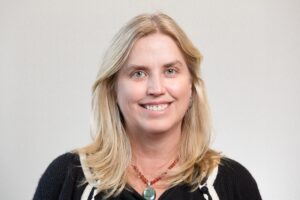 Laurie Brooks has been bringing meaningful arts experiences to incarcerated men, women, and youth since she began working with the WJA in 1989. As Executive Director since 2001, she led the growth and development of the WJA Prison Arts Project, WJA Community Youth Arts Project, the Arts in Youth Authority, and Arts in Mental Health programs. She has been a strong collaborator with the California Arts Council, and for 15 years, helped the National Endowment for the Arts establish Artist-in-Residence programs within the Federal Bureau of Prisons. Laurie is currently overseeing WJA’s Prison Arts Project in 17 California state prisons. She has degrees in Economics and Community Studies from the University of California Santa Cruz. A ceramic artist.
Laurie Brooks has been bringing meaningful arts experiences to incarcerated men, women, and youth since she began working with the WJA in 1989. As Executive Director since 2001, she led the growth and development of the WJA Prison Arts Project, WJA Community Youth Arts Project, the Arts in Youth Authority, and Arts in Mental Health programs. She has been a strong collaborator with the California Arts Council, and for 15 years, helped the National Endowment for the Arts establish Artist-in-Residence programs within the Federal Bureau of Prisons. Laurie is currently overseeing WJA’s Prison Arts Project in 17 California state prisons. She has degrees in Economics and Community Studies from the University of California Santa Cruz. A ceramic artist.
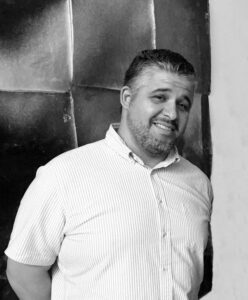 Jose Joey Reyes comes to the WJA via the cultural arts sector where he worked for over ten years as a program director and curator. His experience consists of donor development, museum education, volunteer management, program and exhibition development, and youth mentorship. His prior curatorial work approached issues ranging from the effects of climate change on communities of color to housing rights and immigration. He holds a BFA in pictorial studies from San Jose State University with two years of additional study at Syracuse University. As Prison Arts Program Manager, Joey hopes to affirm founder Eloise Smith’s vision to provide individuals with the most meaningful art experience possible and to uphold the values of Dignity, Mutual Respect, Determination, Healing, and Redemption for every program participant
Jose Joey Reyes comes to the WJA via the cultural arts sector where he worked for over ten years as a program director and curator. His experience consists of donor development, museum education, volunteer management, program and exhibition development, and youth mentorship. His prior curatorial work approached issues ranging from the effects of climate change on communities of color to housing rights and immigration. He holds a BFA in pictorial studies from San Jose State University with two years of additional study at Syracuse University. As Prison Arts Program Manager, Joey hopes to affirm founder Eloise Smith’s vision to provide individuals with the most meaningful art experience possible and to uphold the values of Dignity, Mutual Respect, Determination, Healing, and Redemption for every program participant
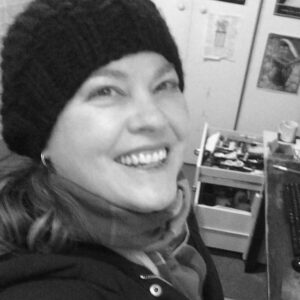 Breann Beal, Administrative Assistant, has held many roles at the William James Association since 2006. She first served as a VISTA program arts instructor for at-risk high school students, then became the event coordinator and curator for a major WJA anniversary art auction. After receiving her B.A. from UCSC in fine art, she provided graphic design, marketing, and community outreach services as a contractor. Now on staff, she coordinates artists and vendors and manages a number of projects. With a background in printmaking and performance, she appreciates the WJA underlying creative spirit, and she works to maintain the strong reputation for service in the arts and community development that this non-profit has earned for over 40 years.
Breann Beal, Administrative Assistant, has held many roles at the William James Association since 2006. She first served as a VISTA program arts instructor for at-risk high school students, then became the event coordinator and curator for a major WJA anniversary art auction. After receiving her B.A. from UCSC in fine art, she provided graphic design, marketing, and community outreach services as a contractor. Now on staff, she coordinates artists and vendors and manages a number of projects. With a background in printmaking and performance, she appreciates the WJA underlying creative spirit, and she works to maintain the strong reputation for service in the arts and community development that this non-profit has earned for over 40 years.
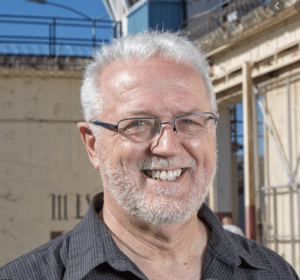 Steven Emrick, Prison Arts Specialist, has over thirty years of providing Arts Programming as an Artist Facilitator at three different state prisons and in the Youth Authority. He recently retired as the Community resources manager at San Quentin State Prison where he coordinated over 50 different self-help programs and managed over 2,000 volunteers and guest visitors annually. In 2009 Steven received a Heroes of Compassion from the Dalai Lama for his work providing arts programming to incarcerated populations. He has an MA from Central Washington State University in Wood Design and a Master of Fine Arts degree in Sculpture and Furniture design from San Diego State University.
Steven Emrick, Prison Arts Specialist, has over thirty years of providing Arts Programming as an Artist Facilitator at three different state prisons and in the Youth Authority. He recently retired as the Community resources manager at San Quentin State Prison where he coordinated over 50 different self-help programs and managed over 2,000 volunteers and guest visitors annually. In 2009 Steven received a Heroes of Compassion from the Dalai Lama for his work providing arts programming to incarcerated populations. He has an MA from Central Washington State University in Wood Design and a Master of Fine Arts degree in Sculpture and Furniture design from San Diego State University.
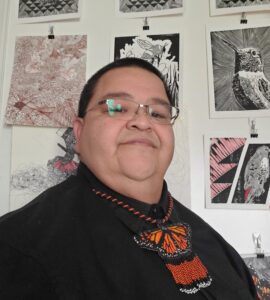 Henry Edward Frank, Communications Administrator, is a member of the Pomo and Yurok Nations, an artist, a block printer, a creative writer, a poet, a photographer, and a returned citizen.At nineteen he was sentenced to 29 years to Life in the State of California prison system. He was paroled in 2013, at age thirty-nine. Art has always been in his life. During his incarceration, he participated in Arts in Corrections where he was first introduced to the William James Association and to block printing, bookbinding, creative writing, color theory, and more. For three years, Henry served as a clerk to the Artist Facilitator, assisting with proposals, memos, accounting, inventory, scheduling, art and food sales, concert and event production, and participant relations and conflict resolution.
Henry Edward Frank, Communications Administrator, is a member of the Pomo and Yurok Nations, an artist, a block printer, a creative writer, a poet, a photographer, and a returned citizen.At nineteen he was sentenced to 29 years to Life in the State of California prison system. He was paroled in 2013, at age thirty-nine. Art has always been in his life. During his incarceration, he participated in Arts in Corrections where he was first introduced to the William James Association and to block printing, bookbinding, creative writing, color theory, and more. For three years, Henry served as a clerk to the Artist Facilitator, assisting with proposals, memos, accounting, inventory, scheduling, art and food sales, concert and event production, and participant relations and conflict resolution.
Our Commitment
Land Acknowledgement
We would like to honor the Amah Mutsan people, who were the original caretakers of the land where the William James Association office is located. We do not condone the mistreatment of the Amah Mutsan people that the Mission of Santa Cruz inflicted upon them. They were put into slavery, forcibly baptized, forced to be educated in the colonizers way of life and forced to live as Mission Indians. We periodically burn sage to honor those spirits that are still taking care of this land. We stand in solidarity with the Amah Mutsan people and all indigenous people and their causes to become more visible, more independent, and more empowered.
To find out the Indigenous Nation that inhabitant and steward the land where you live, click the link below
http://www.ncidc.org/sites/default/files/education_graphics/CalTribe-precontact.jpg
Humanizing Language
At the William James Association, one of our values is to uphold positive humanizing language to change the narrative and remove the negative connotations of incarceration faced by those who have or are currently experiencing incarceration. Resources can be found HERE.
Diversity, Equity and Inclusion
The William James Association was founded in 1973 to promote work service in the arts, environment, education, and community development. Our Prison Arts Project was founded in 1977 with the radical belief that the practice of making art cultivates transformation and improves lives. Since then our work has been primarily centered around arts experiences in nontraditional settings, serving men and women in and after prison and high-risk youth. Acting on the conviction that the fine arts enrich, heal and unite communities, the William James Association has brought exceptional artists into prisons throughout California and other states. We provide meaningful arts experiences for many thousands of men, women and youth impacted by the criminal justice system.
Blog/Media
35th Anniversary – Celebrated in 2008
Join us to celebrate the William James Association,the Prison Arts Project and you! If you have ever been a part of: Penny University, Prison Arts Project, William James, Work Company, Revolutionary Broadsides, Santa Cruz Artists and Craftspeople, The Community Gardens Program, Fruition, Museum Without Walls, Festival of Living Music (Baroque…
Prison Arts Project at San Quentin – Update
The Prison Arts Project at San Quentin is going strong with activities seven days a week – painting, drawing and printmaking classes, inmate bands, theater, writing workshops and book-binding. We received a $25,000 challenge grant from the Marin Community Foundation, which means that your donation to support the Prison Arts…
SQ Arts Slide Show by Peter Merts featured on Photo Philanthropy
Peter Merts’ Slide Show of San Quentin’s Arts In Corrections program is featured on Photo Philanthropy – a new website that is dedicated to showcasing the work of photo documentaries. Kudos to Peter for his beautiful photography that shows off the beauty of what is happening in the 20×40 box that is…
Video: Poetry Program Gives Prisoners Unexpected Voice
Just wanting to share a story from the PBS NewsHour about the power, beauty, and complexity of poetry classes in prison: Richard Shelton, a poet and professor at the University of Arizona, has been coming into prisons as a volunteer since the early ’70s, when a man on death row…
Community Partners
Donors
The William James Association is a nonprofit, community service corporation founded in 1973 by Page Smith and Paul Lee. The association is named for the American philosopher, William James, who was deeply concerned with the relationship between philosophical thought and social action. In his famous essay, “A Moral Equivalent of War,” James proposed what came to be called “work service” as a substitute for war service.
The William James Association’s original statement of purpose declares, “the Association will direct its attention to developing various forms of peacetime service.” From its inception, the Association has had a strong commitment to some form of national (as well as local and state) work service, modeled, to a degree, on the Civilian Conservation Corps of the 1930s. In line with this commitment, the Association helped to launch the California Conservation Corps in 1979.
One of the Association’s early projects was the William James Work Company. With the sponsorship of the Association, unemployed or marginally employed persons organized to facilitate finding jobs. In the five years of the Work Company’s existence, over 30,000 jobs were filled.The Citizens’ Committee for the Homeless was originally under the William James Association umbrella and was the impetus for the purchase of the River Street Shelter in Santa Cruz, CA. WJA also sponsored A Free Meal, which has become Santa Cruz’s Homeless Community Resource Center. Other projects undertaken by WJA over the years include: the Penny University, Museum Without Walls, Community Gardens, Fruition, the Prison Arts Project, and related arts programs in California Youth Authority, the California Department of Mental Health, and the Santa Cruz County Jail.
Through the vision and efforts of Eloise Smith, the William James Association began the Prison Arts Project in 1977 as a pilot program at the California Medical Facility, a prison in Vacaville, CA. Since that time, WJA has dedicated itself to providing arts experiences to incarcerated individuals in the belief that participation in the artistic process significantly and positively affects one’s view of oneself and the world. WJA’s award-winning Community Youth Arts Project grew out of the Prison Arts Program’s success and the desire to intervene with youths at risk of incarceration or other marginalization.
Colleagues
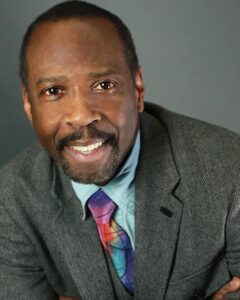 Thomas-Whit Ellis was appointed at Fresno State in 1991. He currently holds the rank of full professor in the Theatre Arts Department. He also serves as department chair of Africana Studies. Professor Ellis has directed dozens of plays for the University Theatre program including Native Son, Colored Girls, and The Gospel at Colonus. He also directed numerous productions throughout the region including God’s Trombones at the Central California Women’s Facility, Chowchilla. He was appointed Fulbright Scholar at the National Taiwan University where he directed the university’s first main stage production, David Henry Hwang’s Golden Child, (performed in English and Mandarin). Other international credits include El Hajj Malik at the National Theatre of Nigeria, Lagos and Death and the Maiden, Van Troi Theatre, Santiago de Cuba, Cuba. He has appeared in several movies and is an active member of the Screen Actors Guild and the American Federation of Radio and Television Artists. He currently serves on the boards of The Fresno Arts Council, Valley Public TV Community Advisory, Arte Americas, and The William James Association, Santa Cruz.
Thomas-Whit Ellis was appointed at Fresno State in 1991. He currently holds the rank of full professor in the Theatre Arts Department. He also serves as department chair of Africana Studies. Professor Ellis has directed dozens of plays for the University Theatre program including Native Son, Colored Girls, and The Gospel at Colonus. He also directed numerous productions throughout the region including God’s Trombones at the Central California Women’s Facility, Chowchilla. He was appointed Fulbright Scholar at the National Taiwan University where he directed the university’s first main stage production, David Henry Hwang’s Golden Child, (performed in English and Mandarin). Other international credits include El Hajj Malik at the National Theatre of Nigeria, Lagos and Death and the Maiden, Van Troi Theatre, Santiago de Cuba, Cuba. He has appeared in several movies and is an active member of the Screen Actors Guild and the American Federation of Radio and Television Artists. He currently serves on the boards of The Fresno Arts Council, Valley Public TV Community Advisory, Arte Americas, and The William James Association, Santa Cruz.
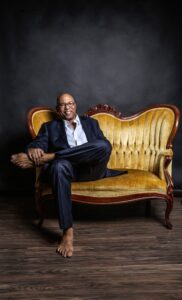 Henry Robinett is a guitarist and composer living in Sacramento, Ca. He has released 7 albums under his own name and has three more in the can. His latest Jazz Standards Vol 2 Then Again, reached #10 on the prestigious JazzWeek chart. He has taught jazz at the University of the Pacific and The American Institute of Music in Vienna, Austria. Henry’s father was the first cousin of jazz great Charles Mingus. Henry lived with him briefly where he met luminaries such as Joni Mitchell, Dexter Gordon, Sonny Rollins, Ornette Coleman, Dizzy Gillespie, and Woody Shaw. For the last 30 years, Henry has been teaching music in the California prison system. He believes in giving back.
Henry Robinett is a guitarist and composer living in Sacramento, Ca. He has released 7 albums under his own name and has three more in the can. His latest Jazz Standards Vol 2 Then Again, reached #10 on the prestigious JazzWeek chart. He has taught jazz at the University of the Pacific and The American Institute of Music in Vienna, Austria. Henry’s father was the first cousin of jazz great Charles Mingus. Henry lived with him briefly where he met luminaries such as Joni Mitchell, Dexter Gordon, Sonny Rollins, Ornette Coleman, Dizzy Gillespie, and Woody Shaw. For the last 30 years, Henry has been teaching music in the California prison system. He believes in giving back.
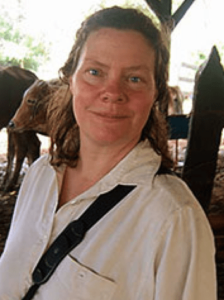 Rachel O’Malley Ph.D is a Professor of Biology at the University of California, Santa Cruz. O’Malley’s research interests include Insect Ecology, Conservation & Restoration; Environmental Justice & Impact Assessment; International & California Coastal Sustainable Agriculture. O’Malley also maintains a working relationship with the Center for Agroecology at UC Santa Cruz, Santa Cruz, CA, and is an advisor for Master of Science students in research on conserving pollinators, reducing farm runoff, and understanding pest/enemy dynamics in farm fields in Santa Cruz and Santa Clara Counties, California. Internationally, O’Malley supervises students working on the ecological impacts of banana production, shrimp farming, cacao, and cattle production in Costa Rica, Nicaragua, and Colombia, respectively, and runs the sustainable agriculture garden on Campus at San Jose State University, San Jose, CA. O’Malley serves on boards of a range of local nonprofit organizations, government commissions, and political organizations.
Rachel O’Malley Ph.D is a Professor of Biology at the University of California, Santa Cruz. O’Malley’s research interests include Insect Ecology, Conservation & Restoration; Environmental Justice & Impact Assessment; International & California Coastal Sustainable Agriculture. O’Malley also maintains a working relationship with the Center for Agroecology at UC Santa Cruz, Santa Cruz, CA, and is an advisor for Master of Science students in research on conserving pollinators, reducing farm runoff, and understanding pest/enemy dynamics in farm fields in Santa Cruz and Santa Clara Counties, California. Internationally, O’Malley supervises students working on the ecological impacts of banana production, shrimp farming, cacao, and cattle production in Costa Rica, Nicaragua, and Colombia, respectively, and runs the sustainable agriculture garden on Campus at San Jose State University, San Jose, CA. O’Malley serves on boards of a range of local nonprofit organizations, government commissions, and political organizations.
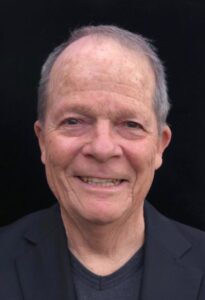 Jack Bowers is a pianist, performing musician, songwriter/composer and arts administrator. For twenty-five years he directed the Arts in Corrections program at Soledad State Prison, which involved hundreds of inmates in weekly fine arts activities, ranging from creative writing classes to music theory to luthiery. Currently, in addition to performing, teaching, and recording in the Santa Cruz area, he is an active advocate for arts programming for prisoners and at-risk youth through the William James Association. For the past seven years he has been a mentor for artists teaching in California prisons.
Jack Bowers is a pianist, performing musician, songwriter/composer and arts administrator. For twenty-five years he directed the Arts in Corrections program at Soledad State Prison, which involved hundreds of inmates in weekly fine arts activities, ranging from creative writing classes to music theory to luthiery. Currently, in addition to performing, teaching, and recording in the Santa Cruz area, he is an active advocate for arts programming for prisoners and at-risk youth through the William James Association. For the past seven years he has been a mentor for artists teaching in California prisons.
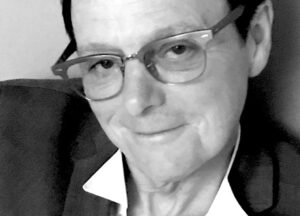 Nigel Sanders-Self is a theater, film and multimedia producer/ director. He has been a member of the board for over thirty years and has directed and performed in productions in institutions including Vacaville, Soledad and San Quentin. He is the recipient of three California Art Council grants. He created a relationship between the University of California Shakespeare Santa Cruz touring both Romeo and Juliet and Midsummer Nights Dream in prisons throughout California. Nigel is dedicated to Arts programs in prison that reduce recidivism and promote human rights for incarcerated individuals. He has been influential in recruiting and establishing artists in prisons, in theater, visual arts, creative writing, and music. He was appointed to the board by founding members Page and Eloise Smith.
Nigel Sanders-Self is a theater, film and multimedia producer/ director. He has been a member of the board for over thirty years and has directed and performed in productions in institutions including Vacaville, Soledad and San Quentin. He is the recipient of three California Art Council grants. He created a relationship between the University of California Shakespeare Santa Cruz touring both Romeo and Juliet and Midsummer Nights Dream in prisons throughout California. Nigel is dedicated to Arts programs in prison that reduce recidivism and promote human rights for incarcerated individuals. He has been influential in recruiting and establishing artists in prisons, in theater, visual arts, creative writing, and music. He was appointed to the board by founding members Page and Eloise Smith.
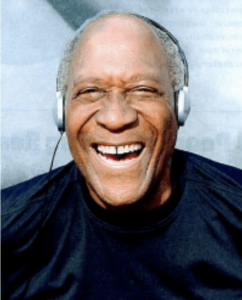 Wayne D. Cook is a proud retiree from the California Arts Council, where he was Program Manager of the Artists in School’s Program and the ADA/504 Disability Coordinator. Retirement hasn’t slowed Mr. Cook down, as he continues to consult for the William James Association and Arts in Correction at Solano Prison. He continues working with the Educational Department for the Sacramento Theatre Company (STC) and prior to the pandemic, continued to act in such productions as, To Kill A Mockingbird at STC, The Iceman Cometh for the Actor’s Theatre of Sacramento and only a few years ago received the Elly award for acting in Learning Spanish at the Wilkerson Theatre. Mr. Cook is the author of a drama curriculum, Center Stage, A curriculum for the Performing Arts. First published in the ninety, you can still purchase Center Stage on Amazon.
Wayne D. Cook is a proud retiree from the California Arts Council, where he was Program Manager of the Artists in School’s Program and the ADA/504 Disability Coordinator. Retirement hasn’t slowed Mr. Cook down, as he continues to consult for the William James Association and Arts in Correction at Solano Prison. He continues working with the Educational Department for the Sacramento Theatre Company (STC) and prior to the pandemic, continued to act in such productions as, To Kill A Mockingbird at STC, The Iceman Cometh for the Actor’s Theatre of Sacramento and only a few years ago received the Elly award for acting in Learning Spanish at the Wilkerson Theatre. Mr. Cook is the author of a drama curriculum, Center Stage, A curriculum for the Performing Arts. First published in the ninety, you can still purchase Center Stage on Amazon.
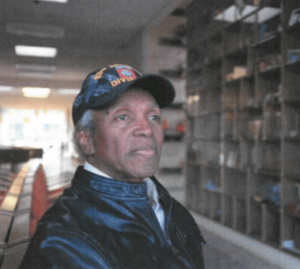 Wesley Haye, is a Vietnam-era combat veteran who served with the 82nd Airborne Division. He is committed to assisting other veterans and aims to assist them in finding their way out of the dark. He has first hand experience with the many struggles veterans go through, including homelessness and prison. But he believes that with the opportunity to live as a community, veterans can raise each others self-esteem and sense of self-worth. He is the founder of Wesley Haye Enterprise, LLC, which is dedicated to assisting veterans with finding affordable housing options in Monterey County, California.
Wesley Haye, is a Vietnam-era combat veteran who served with the 82nd Airborne Division. He is committed to assisting other veterans and aims to assist them in finding their way out of the dark. He has first hand experience with the many struggles veterans go through, including homelessness and prison. But he believes that with the opportunity to live as a community, veterans can raise each others self-esteem and sense of self-worth. He is the founder of Wesley Haye Enterprise, LLC, which is dedicated to assisting veterans with finding affordable housing options in Monterey County, California.
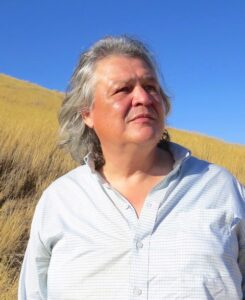 Jose Antonio Aguirre has received national and international awards, including the Fulbright-Garcia Robles awarded by the United States State Department and the Cultural Exchange International grant from the City of Los Angeles Department of Cultural Affairs to produce a community public art project in Mexico. Aguirre has been a teacher and Artist-In-Residence in various institutions, and given several lectures and workshops at universities, museums and cultural institutions around in Germany, Mexico, Scotland and the United States. He obtained a BFA from the School of the Art Institute of Chicago (1982) and an MFA from California Institute of the Arts (1990). Since 1976 he has lived and worked in Chicago, Austin, Los Angeles, Mexico City and Colima City, currently resides and works in Pasadena, California.
Jose Antonio Aguirre has received national and international awards, including the Fulbright-Garcia Robles awarded by the United States State Department and the Cultural Exchange International grant from the City of Los Angeles Department of Cultural Affairs to produce a community public art project in Mexico. Aguirre has been a teacher and Artist-In-Residence in various institutions, and given several lectures and workshops at universities, museums and cultural institutions around in Germany, Mexico, Scotland and the United States. He obtained a BFA from the School of the Art Institute of Chicago (1982) and an MFA from California Institute of the Arts (1990). Since 1976 he has lived and worked in Chicago, Austin, Los Angeles, Mexico City and Colima City, currently resides and works in Pasadena, California.
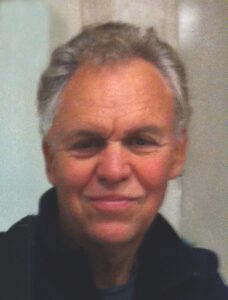 William “Bill” Cleveland is a pioneer in the cultural community development movement and one of its most poetic documenters. His books Art in Other Places and Making Exact Change and Art and Upheaval, are considered seminal works in the field. Organizer, teacher, researcher, and musician, he also directs the Center for the Study of Art and Community. The Center works to integrate the arts and community life, focusing on, the development of cultural partnerships, and training for artists, and their community, and business partners. Bill has also led the Walker Art Center’s Education. Department (1995-97). California’s Arts-In-Corrections Program (1981-1989), and the California State Summer School for the Arts (1989-1991). His most recent book Between Grace and Fear: The Role of the Arts in a Time of Change written with Patricia Shifferd was published in 2012. His CD, SongLines, based, in part, on stories from Art and Upheaval, was released in 2014.
William “Bill” Cleveland is a pioneer in the cultural community development movement and one of its most poetic documenters. His books Art in Other Places and Making Exact Change and Art and Upheaval, are considered seminal works in the field. Organizer, teacher, researcher, and musician, he also directs the Center for the Study of Art and Community. The Center works to integrate the arts and community life, focusing on, the development of cultural partnerships, and training for artists, and their community, and business partners. Bill has also led the Walker Art Center’s Education. Department (1995-97). California’s Arts-In-Corrections Program (1981-1989), and the California State Summer School for the Arts (1989-1991). His most recent book Between Grace and Fear: The Role of the Arts in a Time of Change written with Patricia Shifferd was published in 2012. His CD, SongLines, based, in part, on stories from Art and Upheaval, was released in 2014.
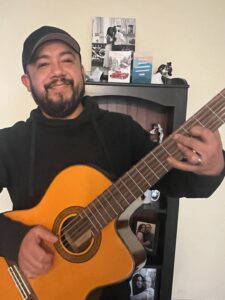 Felix Lucero is of Mexican descent, a Returning Resident (coming up on 10 years), a sheet-metal worker, a husband and father. He is a visual artist, specifically a block printer. He has produced museum quality prints and has prints in the Library of Congress. He is a prolific writer and a self-taught guitarist. Since then, he has been focused on his life and his family. Now that he has established his life, he reached out to Henry and asked him, “how can I give back?”. He appreciated his time in the Arts in Corrections and wants to make sure that the WJA is around long after all of us are gone. He brings to the board insight into the struggles, challenges and needs of the populations (currently and formerly incarcerated individuals) we are serving. He is ready to be of service and become an active participant in moving the William James Association into the future.
Felix Lucero is of Mexican descent, a Returning Resident (coming up on 10 years), a sheet-metal worker, a husband and father. He is a visual artist, specifically a block printer. He has produced museum quality prints and has prints in the Library of Congress. He is a prolific writer and a self-taught guitarist. Since then, he has been focused on his life and his family. Now that he has established his life, he reached out to Henry and asked him, “how can I give back?”. He appreciated his time in the Arts in Corrections and wants to make sure that the WJA is around long after all of us are gone. He brings to the board insight into the struggles, challenges and needs of the populations (currently and formerly incarcerated individuals) we are serving. He is ready to be of service and become an active participant in moving the William James Association into the future.
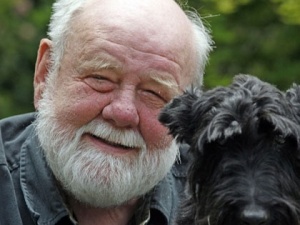
Our Story
Paul Lee and Page Smith founded the William James Association in 1974. WJA board member Nigel Sanders-Self met with Paul recently and made these short videos of Paul talking about the origins of WJA and the Prison Arts Project.
Support WJA
Your support of WJA fuels new paths forward for artists serving the needs of their community, bringing connection, hope, and possibility through their creative enterprises.